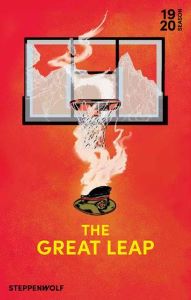
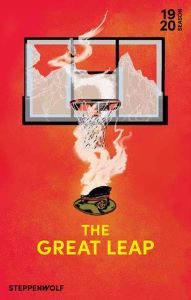 Recommended *** You don’t have to be an avid basketball fan to enjoy watching “The Great Leap” written by Lauren Yee and directed by Jesca Prudencio and performed by the Steppenwolf Theatre Company. Yee’s original script is a tribute to her father and his basketball legend days, although it tells a somewhat different story from his. In this script, Chinese-American Manford Lum (Glenn Obrero), is a ballsy, upstart, short young man from San Francisco’s Chinatown community with the strong ambition to play on the University of San Francisco basketball team, slated to play a rematch game at Beijing University in 1989.
Recommended *** You don’t have to be an avid basketball fan to enjoy watching “The Great Leap” written by Lauren Yee and directed by Jesca Prudencio and performed by the Steppenwolf Theatre Company. Yee’s original script is a tribute to her father and his basketball legend days, although it tells a somewhat different story from his. In this script, Chinese-American Manford Lum (Glenn Obrero), is a ballsy, upstart, short young man from San Francisco’s Chinatown community with the strong ambition to play on the University of San Francisco basketball team, slated to play a rematch game at Beijing University in 1989.
Back in 1971, Nixon and Kissinger’s opening up of U.S. relations with China was called ping-pong diplomacy. But diplomacy between the two nations was also furthered by basketball, the only Western sport that Chairman Mao Zedong did not ban during the Cultural Revolution. Hailed as a friendship game, the Americans won the original contest. However, eighteen years later, the rematch between the U.S. and China took on new meaning: The game was no longer an icebreaker but had more to do with China’s intention to show up the West: a symbolic spectacle aimed at flaunting the Communist nation’s moral, cultural, and economic superiority on the world’s stage.
However, the 1989 visit of the U.S. basketball team happened to coincide with the pro-democracy protests in Beijing’s Tiananmen Square. How embarrassing this was to the Chinese government! The student-led movement was a reaction to the rapid economic development and social changes being implemented by Chairman Deng Xiaoping and the Chinese Communist Party. Street demonstrations, fueled in part by Western ideology (that promoted the virtue of civil liberties), brought to light anxieties about the country’s future: its growing political elite and its move to state capitalism. For their part, Communist Party leaders believed that the students were a threat to their vision of social progress in the post-Cultural Revolution.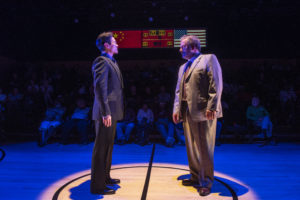
The play itself has to do with ethnic and generational cultural clashes between and among the Chinese and Americans during this time period. Manford, who has yet to graduate from high school, understands the social and political ramifications of playing the Chinese nationals, even if other people do not. With tons of confidence in his ball-handling talent, he has already beaten older and more experienced college players in his position of point guard and begs to play on the all-American team soon to travel to China. Not content with taking no for an answer, he dares Coach Saul Schmansky (Keith Kupferer) to allow him live his dream and, in fact, winds up on the USF team. Connie (Deanna Myers) is Manford’s (adopted) cousin, argues with Manford about traveling abroad but ultimately signs all the necessary paperwork that allows him to play with his teammates. During practice, the coach talks an aggressive game by shaming his players into doing their best, but it is Manford who is the embodiment of hard work, resilience, focus, and achievement. He is the player to be emulated.
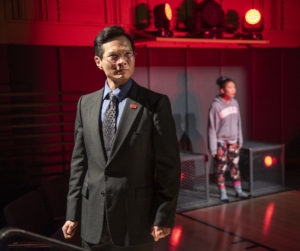 Wen Chang (James Seal) is the opposing coach for the Chinese basketball team and has a long history with Coach Schmansky, beginning with their acquaintance in 1971. Both men are looking forward to the matchup and the rekindling of their friendship.
Wen Chang (James Seal) is the opposing coach for the Chinese basketball team and has a long history with Coach Schmansky, beginning with their acquaintance in 1971. Both men are looking forward to the matchup and the rekindling of their friendship.
Then there is the underlying story. Suffice it to say that it is not infinitely predictable. Far from it! What happens in the second act is unexpected and recommends the show. Although the play teaches us about some portion of Chinese history and culture that we may or may not already know about, there is a flaw in the script. We never learn the full details of the travels and travails of Manford’s mother. This is touched upon by two of the characters, but it is never fully explained how she left China and emigrated to the U.S.A. at a time when it would have been incredibly difficult, if not impossible, to do so, considering the political climate under Chairman Mao.
Kudos to Justin Humphreys who designed the set to look like a basketball court, complete with scoreboards and video screens. Rosean Davonte Johnson aptly handles the projection design using photoshopped documentary film footage. This adds an extra creative touch of immediacy and realism, because such film footage from the 1970s and 1980s would have normally been broadcast on television news of the era.
Lighting magician Keith Parham calls for a special shout-out. The type of lights and their timing and pulsing throughout the performance tie together the diverse thematic elements of the play. Clever lighting allows us to time-travel back and forth between the years 1971 and 1989. Then too, the lights create the experience of sitting at an actual stadium with a basketball game in progress. Especially captivating is the spectrum of colors that emerge from the luminescent strands embedded in the floor and guided by Manford’s ecstatic dance moves. The powerful impact of the highly imaginative lighting design is without equal.
My guest was so funny in describing the performance afterwards. “You know I love to swear,” she said. “But there is too much swearing in this play.” I agreed that there was an inordinate amount of foul language and coarse sexual 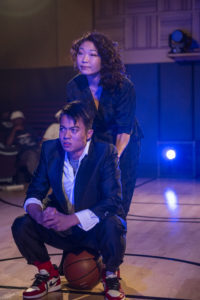 references but felt that this is perfectly appropriate coming from a basketball coach. That said, the overuse of inventive cussing makes the play seem fluffy in the first act and distracts us from the main point of the story. But it is outrageously funny! The audience most certainly enjoyed it.
references but felt that this is perfectly appropriate coming from a basketball coach. That said, the overuse of inventive cussing makes the play seem fluffy in the first act and distracts us from the main point of the story. But it is outrageously funny! The audience most certainly enjoyed it.
In different ways, the characters in “The Great Leap” have one foot planted in the international scene and the other in their day-to-day lives with family, friends, and colleagues. Leaping between these different arenas is, in large part, a theme of the play. But there are other meanings inherent in “The Great Leap.” There was Mao’s “Great Leap Forward”, or the desire to bring China into the 20th century in industry and agriculture. Then there is the meaning of a great leap in basketball as being symbolic of the way that one should lead one’s life. Hence the basketball court is a microcosm of the world at large.
The go-to line that echoes throughout the entire performance is this one: “It’s always your turn.” By this, the coach means that you have to be aggressive and take opportunities when they present themselves. Above all, you have to create your own opportunities when they don’t already exist. This is the hallmark of a winning basketball team—and winning in the game of life.
What we ought to take away from this performance is that we may not know why we are called to play a particular position at a given time and place, but we always need to take charge. We must be the point person that we are meant to be. In so doing, we draw upon our inner strength to bring our goals to fruition; and by our personal example, we can effectively change the world.
“The Great Leap” is playing until October 20, 2019, at the Upstairs Theatre of the Steppenwolf Theatre, 1650 N. Halsted Street, Chicago.
Performances are:
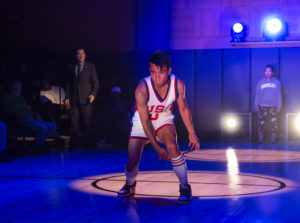 Wednesday, Thursday, Friday, and Saturday – 7:30 p.m.
Wednesday, Thursday, Friday, and Saturday – 7:30 p.m.
3:00 p.m. performances are also available on Saturday, September 21st and 28th
Sunday – 3:00 p.m.
7:30 p.m. performances are also available on Sunday, September 22nd and 29th
There is a 2:00 p.m. performance on Wednesday, October 16th.
Tickets are $20-$89 and are on sale through Audience Services at 312-335-1650 or Steppenwolf.org.
Steppenwolf offers twenty $20 tickets available on the day of the performance beginning at 11:00 a.m. (Monday-Saturday) and 1:00 p.m. on Sunday, by phone only at 312-335-1650. Limit 2 per person. Half-price rush tickets are available one hour before each show. There are a limited number of $15 student tickets available online for each show at steppenwolf.org/students. All groups of 10 or more receive a discounted rate. Go to: steppenwolf.org/groups.
Self parking is located at the parking facility directly south, at 1624 N. Halsted ($15 or $17, cash or card). Valet parking is also available.
To see what others are saying, visit www.theatreinchicago.com, go to Review Round-Up and click at ” The Great Leap”.




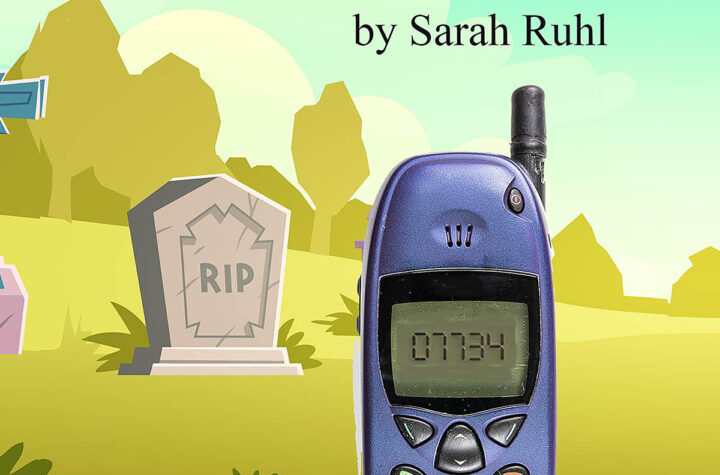

More Stories
“Dead Man’s Cell Phone”
“the distrikt of lake michigun”
“Mother Courage and Her Children” reviewed by Jacob Davis